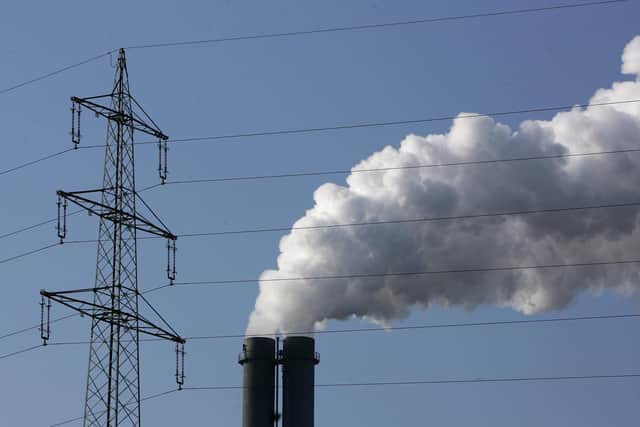Climate change: Fossil-fuel addicts need help to quit just like smokers – Neil Kitching
This article contains affiliate links. We may earn a small commission on items purchased through this article, but that does not affect our editorial judgement.
We have built a world where we can live in large houses, commute long distances and buy short-life, cheap manufactured goods. Our economic system is built on cheap fossil fuels.
But we can learn from how we successfully tackled our addiction to nicotine. In this article, I outline how we have waged a 'war' against smoking and how this is a good analogy for how society should tackle our climate crisis.
Advertisement
Hide AdAdvertisement
Hide AdIf a smoker is unlucky enough to catch lung cancer, then most will wish they had acted to quit smoking earlier.
Similarly, once we really notice the impacts of climate change, we will not be able to reverse many of its effects such as the continued rise in sea level over centuries.
Clearly, in both cases it is sensible to be cautious and to act early to prevent future risks.
Warning signs
In 1950, the British Medical Journal linked smoking to lung cancer. By 1983, the impact of passive smoking was well known – so, like emitting carbon dioxide, smoking harms the environment and other people.


Similarly, the evidence linking our emissions of carbon dioxide to climate change has been well known for decades. The United Nations has brought all countries together every year since 1995 to tackle climate change – yet global emissions keep on rising.
Tobacco companies offered servicemen free cigarettes during the Second World War. In the UK, smoking has declined from its post-war peak of 82 per cent of men in 1948. But smoking rates increased in women to a peak of 45 per cent in 1965, driven by marketing campaigns aimed at empowering women to be 'independent'. There has been a slow but steady decline in smoking since 1974 when regular surveys began.
The offer of free cigarettes is a significant subsidy, similar to the tax breaks that governments have, and still, provide to fossil fuels around the world.


Taxes
In the UK, 80 per cent of the retail price of a packet of cigarettes is tax. This tax is justified by governments to reduce smoking and to spend on heath care. A tobacco duty ‘escalator' was in place between 1993 and 2000. However, as taxes rise, the global trade in illegal cigarettes has soared.
Advertisement
Hide AdAdvertisement
Hide AdThe 'fuel price' escalator ran between 1993 to 1999, then was abandoned after protests by lorry drivers. It is difficult for governments to increase carbon taxes to the level required to radically reduce consumption given that people need to travel, heat their homes and use electricity. So, there are limits to the level of taxes that society will accept. Governments need to regulate too.
There has been a slow tightening of the screw on the promotion of cigarettes from 1965 onwards, culminating in the ban on smoking in enclosed public spaces in 2006 in Scotland.
In parallel, ever tighter restrictions on sale have been introduced. In the UK, all cigarettes are now sold 'under the counter' to prevent impulse buys, with graphic health warnings and a ban on their sale to children under 18.
Because fossil fuels are so integral to our society and lifestyles, we can't ban all fossil fuels today. We need to plan ahead. A good example is the UK government's ban on the sale of new petrol and diesel cars from 2030. This provides industry time to prepare and to innovate.
Legal battles
Manufacturers have introduced lower tar cigarettes and e-cigarettes (vaping) to increase their market share with 'healthier' alternatives. In the climate battle, innovation is absolutely vital. It has reduced the cost of renewable energy and energy storage, paving the way for the widespread adoption of electric cars.
In the USA, smokers and their families have taken tobacco companies to court for selling harmful products. This culminated in 1997 with tobacco firms agreeing a multi-billion-dollar settlement to cover healthcare costs incurred to treat people with smoking-related illnesses.
Some climate activists are now attempting to take governments to court – arguing that they are not safeguarding their citizens – and taking oil companies to court arguing for a pro-rata proportion of damages caused by climate change. There will be long, but significant, court battles ahead.
Public campaigns
For decades the government has run campaigns to educate and motivate people to quit smoking. This has been backed by the health service offering alternatives such as nicotine patches.
Advertisement
Hide AdAdvertisement
Hide AdIn the UK, all school children are now taught about climate change. However, most adults and those in authority have never been taught about climate change. Their knowledge is from books, friends, newspapers and, even worse, from social media. A campaign to educate adults – particularly those in positions of power or authority – is needed.
Of course the anti-smoking campaigners haven't had it all their own way. The tobacco companies have fought against regulations, or argued to delay or water them down. Some have re-focused their efforts to developing countries to create new generations addicted to nicotine.
The oil companies have acted in a similar way, giving ground where they have to, but casting doubt on the science. More recently they have changed tactics to campaign for gradual change, or agreeing that change is necessary – just not now.
There are many similarities between society's efforts to reduce the harm from smoking and those to cut our carbon emissions. After a slow start, a tipping point was reached, when it became culturally unacceptable to smoke in public places.
We need the same decades-long campaign to wean us off our current addiction to burning coal, oil and gas. Soon it will be frowned upon to drive a petrol car, eat beef and dairy, or fly on holiday without robust carbon offsetting.
Your grandchildren will not understand why you did not act earlier.
Neil Kitching is author of Carbon Choices, Common-sense Solutions to our Climate and Nature Crises, and writes a blog at www.carbonchoices.uk
A message from the Editor:
Thank you for reading this article. We're more reliant on your support than ever as the shift in consumer habits brought about by coronavirus impacts our advertisers.
If you haven't already, please consider supporting our trusted, fact-checked journalism by taking out a digital subscription.
Comments
Want to join the conversation? Please or to comment on this article.
